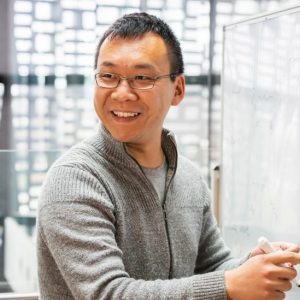Meet the Lecturer – Youming Qiao

Associate Professor Youming Qiao
University of Technology Sydney
We talk to Associate Professor Youming Qiao about isomorphism problems, career paths and why he is so excited to teach at the AMSI Summer School this January.
1. How do you explain your work and its real-world impact to people outside of the mathematical sciences?
We want computers to run faster, and computers are made faster by both better hardware and better software. Better software in turn is supported by better algorithms. So as a theoretical computer scientist, I design algorithms and analyse them to make sure that they are indeed fast. I also want to know if the algorithms we have in hand are the best possible. Sometimes, I look for opportunities to apply my knowledge on algorithmic problems to other practical settings such as secure communication on internet.
2. What drives your interest in this field?
I am always interested in the interaction of algorithms and mathematics. On the one hand, algorithm design and analysis often make novel use of mathematical knowledge, and sometimes lead to new mathematical questions. On the other hand, mathematics gives rise to many deep algorithmic problems, and mathematics can sometimes be understood better with the algorithmic viewpoint in mind. Thanks to this interaction, I have had the opportunities to appreciate several beautiful mathematical structures and ideas, which in turn supported my study in algorithms.
3. What do you consider your biggest achievement to date? (in particular real-world impacts or innovation contributions)
Isomorphism is a central notion in mathematics, and an isomorphism problem asks whether two mathematical structures are secretly the same. While isomorphism problems for combinatorial structures are relatively well understood, our understanding of isomorphism problems for algebraic structures was not satisfactory.
I have been working on isomorphism problems for algebraic structures for a long time. I think my collaborators and I have built a foundation of a theory of such problems. This theory is rooted in computational complexity and algorithms. It creates bridges between problems arising from several areas including group theory, linear algebra, quantum information, and machine learning. It also has promising applications to cryptography. I am excited to see how this has been unfolding so far.
4. What are the next interesting “big questions” or challenges you hope to tackle?
I hope that I can make some non-trivial progress on the so-called polynomial identity testing problem. This problem is closely related to an algebraic version of the P vs NP problem. One of my best results (with collaborators) is to solve a non-commutative version of it, but the original version is well beyond my current reach, though I keep hassling this problem from time to time.
In the meantime, I will also need to work on the “parenting problem” (for my two kids)
5. If not mathematics research, what would have been?
I am not sure but I hope that it would be some job with reading, writing, and learning. To be honest I think my path to theoretical computer science is an accidental one. I started my undergraduate with a major in environmental engineering, and only later transferred to computer science by some luck. So, it could well be the case that I turned out to be an environmental engineer now. During my PhD study, at some point I was not doing well, so I was thinking about working at some IT company. So, it could well be the case that I turned out to do coding at an IT company. But I think I like my current job best though!
6. Deepening field knowledge and providing a networking platform, why are opportunities such as AMSI Summer School so valuable? What do you hope attendees take from your lectures?
I enjoy learning things, having a broad view of the field, and explaining things other people. This AMSI Summer School gives me an invaluable opportunity to share my view and understanding of computational complexity with some of the brightest mathematics students in the country.
I hope that after the lectures, attendees will grasp the organising principles and some beautiful ideas in computational complexity. They will also appreciate that computational complexity has connections to many mathematical areas and leads to deep open questions. I will be especially delighted if some of them have the urge to tackle some open questions introduced in the lectures!
Associate Professor Youming Qiao will be presenting the topic Computational Complexity at the 2022 Summer School hosted by University of Technology Sydney in January.


